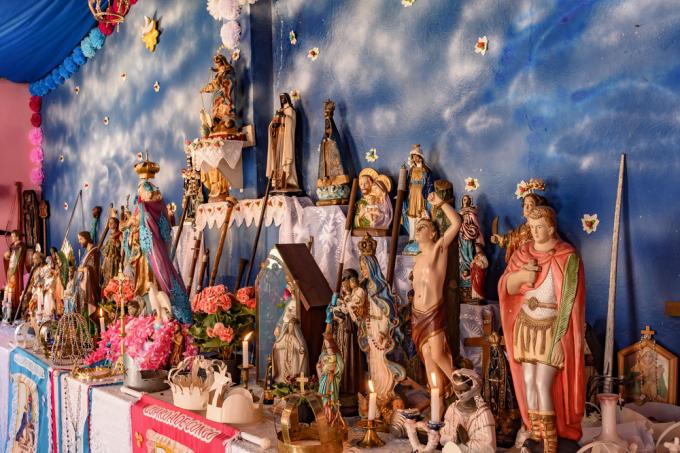the orishas are deities of Yoruba African mythology that became popular in Brazil with African-based religions Umbanda and Candomblé.
Yoruba is a region of Africa made up of diverse ethnic groups with similar language and culture. Many of the blacks brought to Brazil as slaves were from this region.
There are more than 400 orixás in Yoruba mythology, but some of them have become more famous in Brazil, such as Exú, Oxalá, Ogum, Oxóssi, Iemanjá, Xangô and Iansã.
history of the orixás
According to Yoruba mythology, Olodumaré, also known as Olorum, is the Supreme god and inaccessible. He created the world and the orishas to govern it and serve as intermediaries between him and humans.
Olodumaré does not accept offerings, as he is the creator of everything, he has power over everything and there is nothing he does not have.
The orixás represent the elements of nature and Olodumaré is the junction of all these energies. The orixás are not gods, so the religions that worship the orixás are monotheists.
During the colonization of Brazil, many of the blacks brought from Africa to be enslaved were from the Yoruba region and brought with them their beliefs and religious traditions.
Candomblé was the religion that came to be practiced by these enslaved peoples in Brazil, following African traditions and cults and worshiping the orixás of Yoruba mythology.
These religious practices, however, were harshly repressed by the colonizer, who imposed the practice of Catholicism on enslaved blacks.
To continue worshiping their orixás, the Africans used the saints of the Catholic Church to represent their deities. For example, when they prayed to São Jorge, they were actually worshiping Ogun.
Thus began the religious syncretism, which will give rise to another religion of African origin: Umbanda. Umbanda has elements of Candomblé, Catholicism and Spiritism and appears at the beginning of the 20th century.
 Altar of Umbanda.
Altar of Umbanda.
understand what it is syncretism and monotheism.
What are the orixás?
In Yoruba mythology there are hundreds of orixás, but only a few of them are worshiped by the Umbanda and Candomblé religions. In Umbanda, 9 orixás are worshiped, in Candomblé this number can reach 72. Some of the most popular orixás in Brazil are:
exhu
Exú is the intermediary and messenger orixá, responsible for communication between the orixás and men. Exú is the guardian of the paths, he is capable of breaking down barriers. The Exú is sometimes interpreted as an evil deity, but in Yoruba mythology there is no representation of the evil. Like other orixás and human beings, Exú has virtues and defects and can act for good and for bad.
Representation in Christianity: St. Anthony
hopefully
Oxalá is a male deity, he is the creator of all beings and the father of all orixás - with the exception of Logunedé. It represents the sun, creation and life. According to Yoruba mythology, Oxalá tried to create human beings with various materials, but only succeeded when he used clay.
Representation in Christianity: Jesus Christ
know more about hopefully.
ogun
Ogun is the orixá that represents the fight, the conquests, he is the god of war and the archetype of the warrior. He is the warlord and patron of all workers whose trade requires the use of tools.
Representation in Christianity: Saint George
Oxossi
Oxossi lives in the forests and represents abundance, is protector of hunters and governs crops, his symbol is the bow and arrow. He can imitate the sounds of animals to perfection, he is a brave and generous hunter.
Representation in Christianity: San Sebastian
know more about Oxossi.
 Statues of Ogum, Nanã and Iansã in Salvador, Bahia.
Statues of Ogum, Nanã and Iansã in Salvador, Bahia.
Oxum
Oshun is a female deity, she owns fresh water, rivers and waterfalls. She represents delicacy, fertility and motherhood, which is why she is often called “mother Oxum”.
Representation in Christianity: Our Lady of Aparecida or Our Lady of Fatima
know more about Oxum.
Oxumaré
Oxumaré is Nanã's son, he is the deity of movement, of the life cycle. This orisha is man and woman at the same time, he represents dualities, such as day and night, good and evil.
Representation in Christianity: Saint Bartholomew
Shango
In Yoruba mythology, shango is king, that is why it is the orixá who takes care of power, administration and justice. He acts neutrally, is recognized for his wise decisions and has integrity.
Representation in Christianity: Saint Peter or Saint Jerome
know more about Shango.
iansan
Iansã is a powerful warrior, responsible for taking souls to heaven. She is the mistress of winds, thunders, storms and represents rapid change.
Representation in Christianity: Santa Barbara
Yemanja
Iemanjá is the mother of all the orixás-with the exception of Logunedé-, she is the great mother and governs education, family and unions. She is the queen of the seas, protector of sailors and one of the most famous orixás in Brazil.
Representation in Christianity: Our Lady of Conception or Our Lady of the Navigators
 Statue of Iemanjá in Salvador, Bahia.
Statue of Iemanjá in Salvador, Bahia.
know more about Yemanja.
Nana
Nanã is a female deity, who represents motherhood, life and death. According to Yoruba legend, it was Nanã who suggested to Oxalá to use clay for the creation of human beings.
Representation in Christianity: Our Lady Sant’ana
Omolu
Omolú is a great and respected sorcerer, the lord of life and death and god of medicine. He is responsible for moving from one plane to another, for guiding the spirits to a new life - he works in hospitals and cemeteries.
Representation in Christianity: Saint Lazarus
Logunedé
Logunedé is the son of Oxóssi and Oxum and owner of a unique beauty. He is an expert hunter and fisherman and has both masculine and feminine expressions.
Representation in Christianity: Saint Expedite
 Statues of Oxalá, Ogum and Xangô in Salvador, Bahia.
Statues of Oxalá, Ogum and Xangô in Salvador, Bahia.
Learn more about African-based religions: Candomblé, Umbanda and All about Umbanda.
